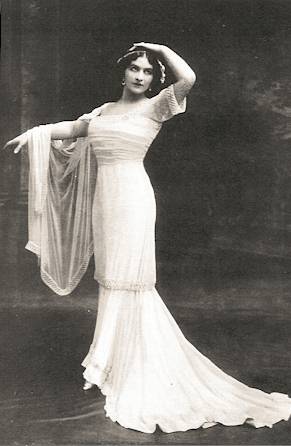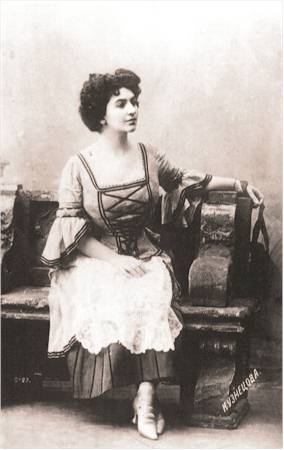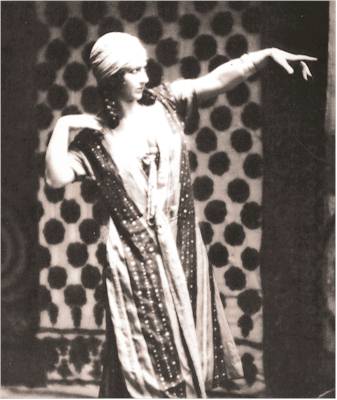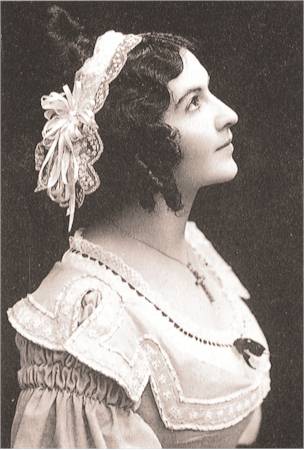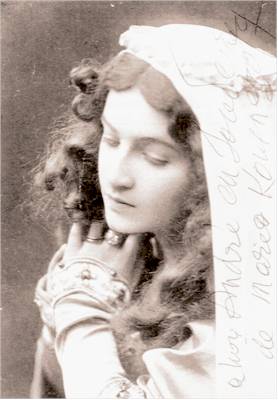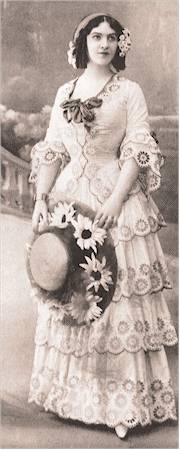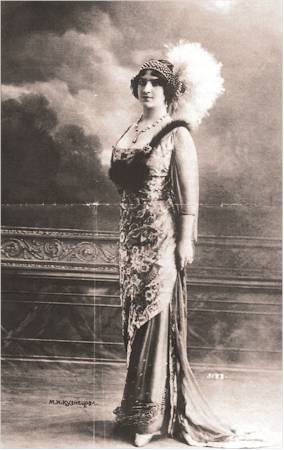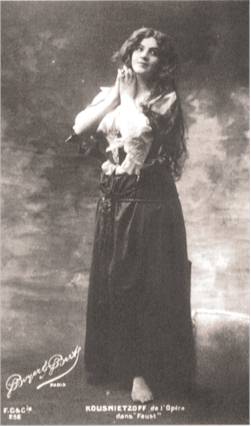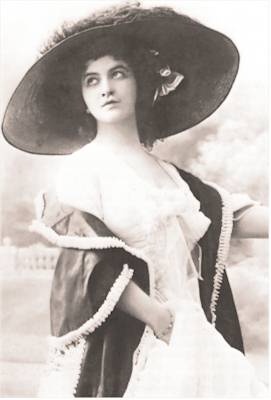Russian soprano, 1880 - 1966
Superb singer - great beauty Biographical notes: In France, known as Kousnetzova or Kouznetzoff (in England, as Kousnezova or Kousnietzoff) ;
this soprano was born in Odessa. Her father was a distinguised portrat painter. She first went into ballet at St. Petersburg, but then she studied singing with baritone Joakim Tartakov and
made her debut as Marguerite at the Mariinsky Theatre where she sang until 1913. Among the premieres in which she took part was Rimsky-Korsakov’s The Legend of the Invisible City of
Kitezh. She also sang Aida and Norma, and she created Cléopâtre (Massenet). Her repertory ranged from Salome, Aida, Norma and Elsa to the lighter roles (Juliette, Mimì). She fled from the
Revolution to Sweden, disguised as a cabin-boy and hidden in a trunk. Maria Kuznetsova was the first Russian singer after Chaliapin
to attach as much importance to acting as to singing. She made her debut as Cléopâtre at the Chicago Opera but Mary Garden reigned at this opera house.
There was no room for both singers. Kuznetsova was never invited again. Paris became her second artistic home where she continued her career with great success. She gave recitals of Russian
music, in which she frequently both sang and danced! Together with
Mikhail Karakash and Benoit she organized an opera company with the name “Opéra Russe,” a chance for many emigrated
Russian singers to appear on stage. They gave performances at the Théâtre des Champs Elysées in Paris, Barcelona, Madrid, Milan and at the Teatro Colón in Buenos Aires. Maria Kuznetsova was
the most celebrated Russian soprano of her day.
As Marguerite
Singing and dancing as Salome in Paris, 1913
As Mimì
As Elsa
As Violetta Comment: There is a number of outstanding Russian sopranos at the turn from the 19th to 20th century: Natalija Ermolenko-Yuzhina,
Medea Mei-Figner, Maria Michailova, Antonina Nezhdanova, Eugenia
Bronskaya, Lydia Lipkowska, Marianna Tcherkasskaya, Maria Kuznetsova and ... As with
Hers is a lyric-dramatic soprano of pure quality. It is not a very large voice but there is a clean attack and she sings high tones with brilliance. You will notice a rapid but narrow vibrato (Taras
Bulba) which helped her to sing above a big orchestra (she was a celebrated Salome!). I admire her subtle coloring and eloquent phrasing. The compilation of Singers of Imperial Russia
gave me lots of insight and pleasure. Her complete recordings: St.Petersburg: G & T 1904 - Magnificent star of love...O my Ratmir (Ludmilla in Ruslan and Ludmilla / Glinka)
- È strano...Ah, fors’ è lui (Violetta in La Traviata / Verdi) Paris: Pathé 1907, 1917, 1920 (a selection) - Adieu notre petite table (Title role in Manon / Massenet) - Sì, mi chiamano Mimì (Mimì in La Bohème / Puccini) - Ah! je veux vivre ((Juliette in Roméo et Juliette / Gounod) -Comme il tient à pensée / Regare-les, ces yeux (Title role in Esclarmonde / Massenet) - Non, je n’ai pas sommeil Creator’s record (Taras Bulba / Samuel-Rousseau) Paris: Odeon 1926 (electric) - Lisa’s aria (Lisa in The Queen of Spades / Tchaikovsky)
Maria Kuznetsova as Tosca
As Fevronia in Rimsky-Korsakov’s “Legend of The Invisible City of Kitezh,” a role she created
As Jacqueline in “Fortunio”
|
||||||||||||||||||||||||
